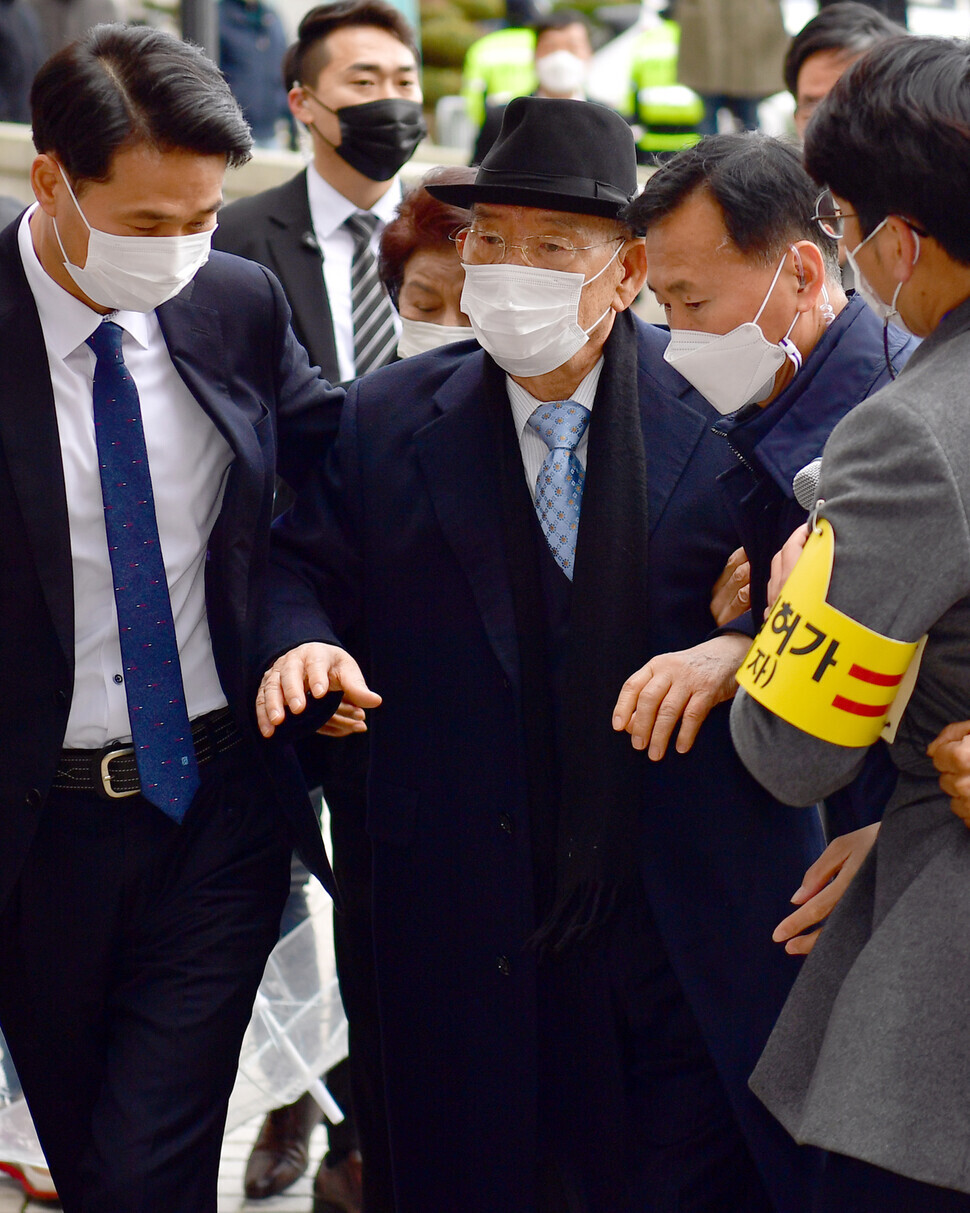hankyoreh
Links to other country sites 다른 나라 사이트 링크
Chun Doo-hwan sentenced to eight months for defaming witness of Gwangju massacre

Former South Korean President Chun Doo-hwan, 89, was once again convicted on charges of distorting the events of the May 1980 Democratization Movement. This comes 23 years after his 1997 conviction on charges of insurrection in connection with the military coup of Dec. 12, 1979, and homicide for the purpose of insurrection in connection with May 1980.
On Nov. 30, Hon. Kim Jeong-hoon of the Gwangju District Court sentenced Chun to eight months in prison following two years of probation on charges of defaming the late Catholic priest Father Cho Pius, who died in 2016.
“The key question in this case, namely whether there was gunfire from military helicopters during the events of May 1980, hinges on the credibility of the most direct evidence, namely eyewitness accounts, and the victim [Cho] consistently maintained between 1980 and his death that he had witnessed soldiers open fire on civilians from an MD 500 helicopter,” Kim said.
“The testimony of eight other witnesses is supported by objective evidence and is consistent with Cho’s account,” he added.
Chun was indicted and tried on charges of defamation of the deceased for a passage in his 2017 memoir that denounced Cho Pius as a “shameless liar” for testifying that he had witnessed shooting from helicopters during the events of May 1980.
“Based solely on an examination of the ‘analysis’ of the Gwangju movement drafted by the local command center for martial law troops, the passage on the ‘high rate of ammunition usage’ was predicated on the fact that soldiers aboard helicopters opened fire,” Kim concluded.
“Taken together, it may be concluded from the evidence that there was gunfire from an MD 500 [helicopter] on May 21, 1980, and from a UH-1H helicopter at the Jeonil Building on May 27, 1980,” he explained.
Chun, who sat wearing a headset with his eyes closed, appeared to nod off while the judge announced the ruling that day. His wife Lee Soon-ja, who accompanied him to court, could be seen looking at him several times as he sat sleeping with his head down. He lifted his head to listen when the judge pronounced his sentence, before being escorted out of the courtroom by a court staffer once the hearing was finished. Reporters asked numerous questions about whether he accepted the ruling or planned to apologize to the people of Gwangju, but Chun offered no response as he exited the courthouse.
Civic groups and Cho’s surviving family members welcome the court’s ruling. Cho Jin-tae, a standing director with the May 18 Memorial Foundation, said, “With this ruling [acknowledging gunfire from helicopters that were not threatened by the civilian militia], the argument that the martial law forces were ‘exercising their self-defense rights’ has been shattered.”
“I am disappointed that Mr. Chun was granted an initial probation period. I was hoping he’d be detained immediately,” Cho said.
Father Cho Yeong-dae, who is Cho Pius’s nephew, said, “Hopefully, this trial can mark the beginning of an investigation into May 1980.”
Kim Jeong-ho, an attorney who represented the plaintiff, said, “I’d like to note the significance of this as a court judgment acknowledging helicopter gunfire during the events of May 1980 as historical fact.”
“As far as the sentencing is confirmed, it is disappointing from a standpoint of judicial punishment that the ruling came with probation, even though the defendant Chun Doo-hwan has never expressed remorse or apologized,” Kim added.
By Kim Yong-hee, Gwangju correspondent
Please direct comments or questions to [english@hani.co.kr]
Editorial・opinion
![[Guest essay] The real reason Korea’s new right wants to dub Rhee a founding father [Guest essay] The real reason Korea’s new right wants to dub Rhee a founding father](https://flexible.img.hani.co.kr/flexible/normal/500/300/imgdb/original/2024/0423/8317138574257878.jpg) [Guest essay] The real reason Korea’s new right wants to dub Rhee a founding father
[Guest essay] The real reason Korea’s new right wants to dub Rhee a founding father![[Column] ‘Choson’: Is it time we start referring to N. Korea in its own terms? [Column] ‘Choson’: Is it time we start referring to N. Korea in its own terms?](https://flexible.img.hani.co.kr/flexible/normal/500/300/imgdb/original/2024/0423/3617138579390322.jpg) [Column] ‘Choson’: Is it time we start referring to N. Korea in its own terms?
[Column] ‘Choson’: Is it time we start referring to N. Korea in its own terms?- [Editorial] Japan’s rewriting of history with Korea has gone too far
- [Column] The president’s questionable capacity for dialogue
- [Column] Are chaebol firms just pizza pies for families to divvy up as they please?
- [Column] Has Korea, too, crossed the Rubicon on China?
- [Correspondent’s column] In Japan’s alliance with US, echoes of its past alliances with UK
- [Editorial] Does Yoon think the Korean public is wrong?
- [Editorial] As it bolsters its alliance with US, Japan must be accountable for past
- [Guest essay] Amending the Constitution is Yoon’s key to leaving office in public’s good graces
Most viewed articles
- 1[Column] ‘Choson’: Is it time we start referring to N. Korea in its own terms?
- 2Why Korea shouldn’t welcome Japan’s newly beefed up defense cooperation with US
- 3Senior doctors cut hours, prepare to resign as government refuses to scrap medical reform plan
- 4[Guest essay] The real reason Korea’s new right wants to dub Rhee a founding father
- 5Opposition calls Yoon’s chief of staff appointment a ‘slap in the face’
- 6[Column] The clock is ticking for Korea’s first lady
- 7Terry Anderson, AP reporter who informed world of massacre in Gwangju, dies at 76
- 8New AI-based translation tools make their way into everyday life in Korea
- 9Samsung barricades office as unionized workers strike for better conditions
- 10Korea ranks among 10 countries going backward on coal power, report shows